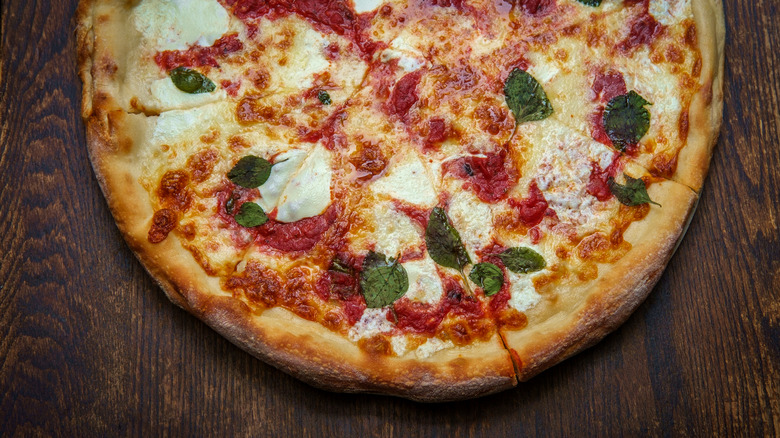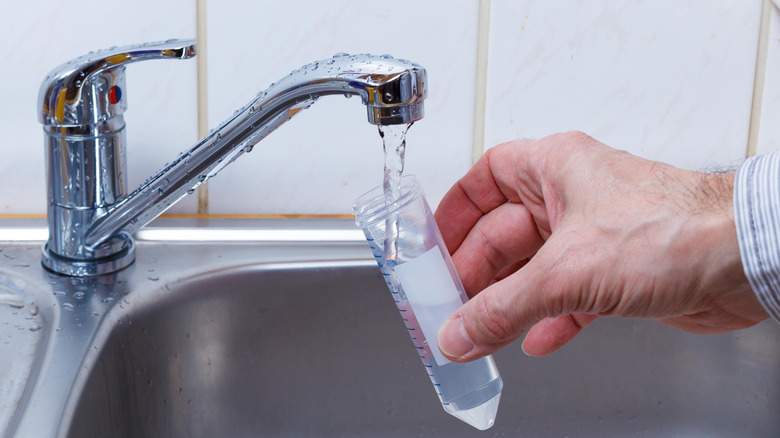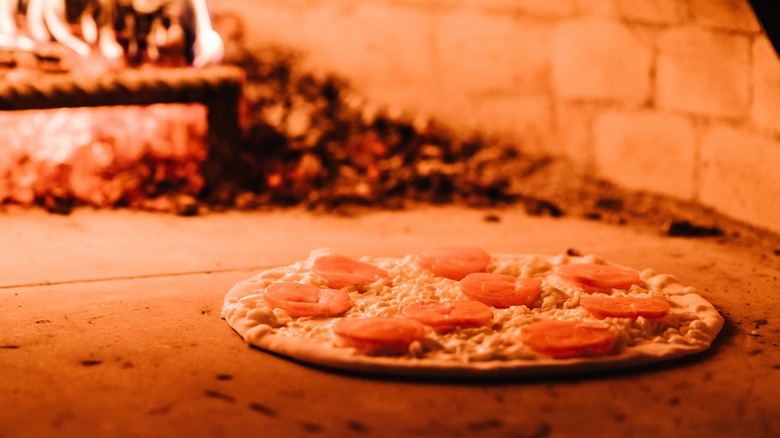Does The Water You Use Affect The Quality Of Your Pizza Dough?
New Yorkers are fiercely loyal to their city's cuisine, especially its pizza. From whole pies to late-night slices, pizza is as much a part of New York City's identity as taking the subway or watching the Knicks lose. According to The New York Times, the city's iconic slice is a direct descendant of traditional Neapolitan pizza, thanks to a wave of Italian immigrants arriving in the late 19th and early 20th centuries. In America, Italian pizzaiolos who traditionally fueled their ovens with wood started using the cheaper options of coal and gas, leading New York pizza to become its own distinct style. But if you ask a local what makes the city's thin crust so special, they probably won't mention the ovens. Instead, they'll tell you it's the water.
New York City's water has been widely touted as the secret behind not only their pizza but their legendary bagels as well. Many chefs have invested in this theory – literally. Washington Square News tells the tale of David Spatafore, who owns a pizzeria in California and has water shipped across the country from New York City. There are also bagel shops in Colorado and Florida that claim to have created sophisticated filtration systems that make their local tap water replicate that of New York's. Serious amounts of time and money have been committed to the theory that the type of water you use can make or break your pizza dough, but is it really true?
What's the deal with New York City's water?
It turns out that there is something unique about New York City's tap water. According to Food & Wine, New York boasts the largest unfiltered water supply system in the United States, and most of that water begins as rain and snowfall in the Catskill Mountains. However, it takes months for the water to make it from there all the way to New York City, during which time it travels through pipes, tunnels, and streams where it becomes infused with a variety of minerals. It's those minerals, acquired along this particular route, that make New York water unique.
Water can be classified as "hard" or "soft" depending on its mineral content. According to WebMD, hard water contains higher amounts of calcium and magnesium. Approximately 85% of the American water supply is hard, which is where New York breaks the mold. Smithsonian Magazine reveals that New York's water is slightly soft, with low levels of calcium and magnesium. Whether you use hard or soft water can affect your pizza dough because hard water strengthens gluten, making it tougher, while soft water makes the dough more, well, soft. New York City's water is softer than most, but not so soft that the dough turns gooey. Smithsonian calls it the "Goldilocks" of water (just right), but while the mineral content may have some beneficial impact on the city's pizza dough, it's not the biggest factor.
The type of water in pizza dough isn't that important
The tap water in New York City is unique, but not enough to have the magical effects some think it does. For starters, WNYC points out that the watershed feeding New York City has changed over the years without affecting the pizza, and besides, the city does have some less-than-stellar pizzerias of its own. Furthermore, The American Chemical Society explored the subject of New York's water in relation to bagel dough and determined that other factors have a much more significant impact. For bagels, it's slow-proofing the dough and boiling the bagels before baking them. When it comes to pizza, long and slow fermentation is also key. Peter Reinhart, a culinary arts instructor and author of "American Pie: My Search for the Perfect Pizza" tells Narratively that "people that understand proper fermentation and access to high-quality flour can typically make pizza and bagels every bit as good in places outside New York."
Reinhart's statement holds up in taste tests. Washington Square News cites a blind taste test conducted by chef and food writer J. Kenji López-Alt in which the subjects could not tell the difference between a pizza made with New York City's water and one without. A similar experiment conducted by America's Test Kitchen found the same thing to be true with bagels. You can buy soft water, or even New York water itself, and test this out, but the results might not be worth it.


